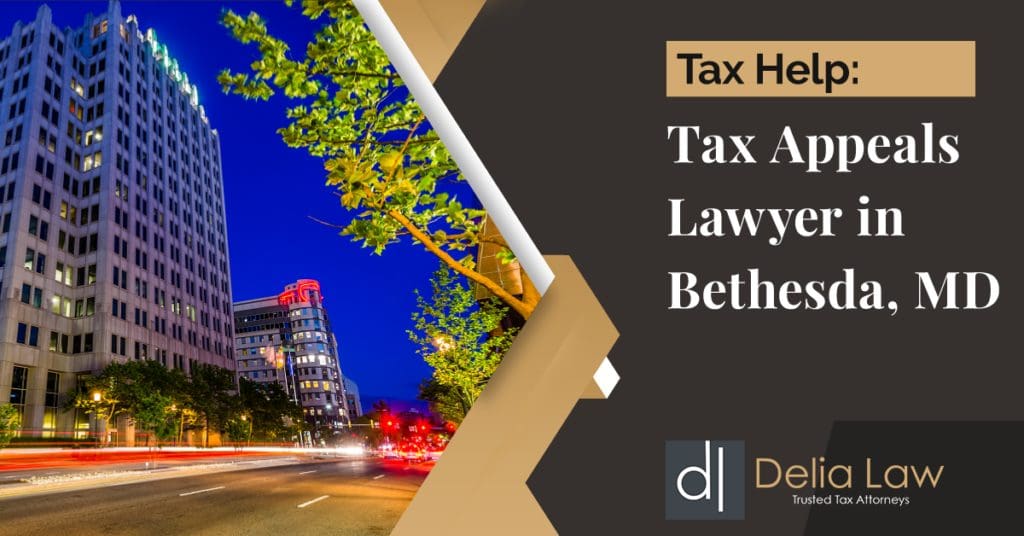Tax Appeals in Bethesda
& Finding a Tax Appeals Lawyer
Tax appeals are a process by which taxpayers can challenge the assessment of taxes made by tax authorities such as the Internal Revenue Service (IRS) in the United States. Taxpayers have the right to file an appeal if they believe that any tax assessment is incorrect or if they feel they have been mistreated. Appeals can be filed at the federal, state, or local level and may be heard by an administrative tribunal or a Bethesda court.
The appeals process begins with the filing of a notice of appeal, which is a formal request for a review of the taxpayer’s case. This request is typically made to the tax authority that issued the original assessment, although it can also be made to a higher court or administrative body. The tax authority will then review the case and decide whether the appeal is valid. If the appeal is valid, a hearing will be scheduled where both the taxpayer and the tax authority can present their evidence and arguments. After hearing both sides, the appeals panel will decide on the case and issue a ruling.
There are several different grounds on which a Bethesda taxpayer can base their appeal, such as:
- Errors in the calculation of the tax. Any errors in the calculation of the tax owed can be grounds to advance a formal appeal. This could include mathematical mistakes made by the tax authority in calculating the amount of tax owed or errors in the application of tax law. If you believe the tax authority has made a mistake in calculating your taxes, you will need to have evidence to support your claim. For example, you may need to provide copies of tax returns or other financial documents that showcase the discrepancy that was overlooked.
- Unfair treatment. Taxpayers can also claim that they have been treated unfairly by the tax authority, even if the tax assessment itself is accurate. This could include discrimination, harassment, or other inappropriate forms of mistreatment by tax officials. If you are in Bethesda and believe you have been treated unfairly by the tax authority, you will need to provide evidence to support your claim. This could include documentation of the treatment you received, witness statements, or communications with tax officials that all point to the alleged mistreatment.
- Inaccurate information. Taxpayers can also claim that the tax authority has used inaccurate information in calculating their taxes. This could include incorrect information about the taxpayer’s income, deductions, or assets which could dramatically affect the amount of tax owed.
When reviewing your tax documents in Bethesda, it is important to look for any errors or discrepancies that may lead to any of these grounds for an appeal. Some specific things to look for include:
- Income. Check that all sources of income have been accurately reported and that the correct amount has been included. This includes wages, interest and dividends, capital gains, and other types of income. Any errors in the income reporting could lead to an incorrect tax bill that is too high and impacts your refund or tax liability.
- Deductions. Check that all eligible deductions have been correctly taken. This includes things like job-related expenses, charitable donations, and medical expenses. Because these deductions can significantly reduce your taxable income, it is important to ensure they are correctly accounted for on your tax return.
- Assets. Check that all assets, such as property or investments, have been correctly valued. This could significantly impact the amount of tax owed if the asset is over or under-valued. Some red flags that may indicate an incorrect asset value include a sudden change in value from one year to the next or a value that is significantly higher or lower than similar assets.
If you believe there are errors or discrepancies in your tax assessment, you can file a Bethesda appeal with the tax authority. The appeals process can be complex and time consuming, though, so it is advisable to seek professional help if you are considering this option.
Delia Law Can Help You With the Tax Appeals Process in Bethesda
The tax appeals process in Bethesda is a common way for taxpayers to challenge the amount of taxes they owe. However, for many individuals, self-representing in a tax appeal can be an overwhelming process that negatively impacts their ability to fully and fairly present their case.
Delia Law has years of experience representing taxpayers in various tax disputes, including appeals. With our help, you can be confident that knowledgeable and experienced professionals are handling your case. We will work with you to understand the specifics of your case and build a strong argument on your behalf. Contact us today if you are ready to start the appeals process and resolve your tax dispute with the help of our experienced team.
Maryland-Specific Tax Laws

Maryland has a progressive tax system, which means the higher an individual’s income is, the higher the percentage they will pay in taxes. Maryland has special tax benefits for military retirees, lower income families, those paying for childcare, as well as for those aged 65 and older.
There are four types of taxes in Maryland:
- State income tax. The state tax rate for personal income tax begins at 2%. This is applied to anyone making under $1,000 per year in annual income. It increases up to 5.75% for anyone making over $250,000 annually. This is one of the lower state income tax rates in the United States.
- Local income tax. There is also a local income tax, which is levied by counties and cities. For convenience, these are withheld during income tax season by the state, and they vary based on the locality. For example, if you live in Allegany County, you paid a .0305 tax rate in 2021. This differs from residents of Baltimore County, who had a .0320 rate. It is important to note that this income is based on the county you live in, not where you work.
- Sales tax. With each purchase in Maryland of a good or service, a 6% sales tax is automatically applied. This does not include every purchase. Groceries, prescription drugs, and gasoline are a few examples of items not subject to sales tax. However, a business is required to collect a 9% tax on any alcoholic beverages sold.
- Property tax. You must pay property taxes in Maryland as well, and the tax rates vary by county. The average effective tax rate is 1.06%. While this might seem low, it is balanced by the high property values in the state. The median home value in Maryland is currently over $400,000 and varies based on proximity to the city of Maryland and other populated areas.














